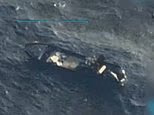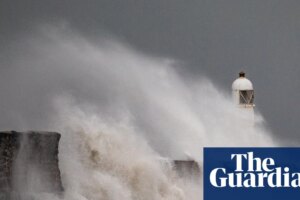
The US military carried out a new strike on Thursday against a suspected drug vessel in the Caribbean – and three members of the crew appears to have survived.
The strike came as President Trump deploys heavy artillery off the coast of Venezuela and Secretary of War Pete Hegseth oversees more changes at the Pentagon.
The Trump administration has labeled those targeted in the strikes as narcoterrorists. The Pentagon did not immediately return a request for comment.
The US military launched search and rescue assets, but it was not clear if any survivors were rescued, according to Fox News.
Prior to Thursday’s operation, US military strikes against suspected drug boats off Venezuela killed at least 27 people, raising alarms among some legal experts and Democratic lawmakers, who question whether they adhere to the laws of war.
The Trump administration argues the US is already engaged in a war with narcoterrorist groups from Venezuela, making the strikes legitimate.
Videos presented by the Trump administration of previous attacks showed vessels being completely destroyed, and there have been no prior accounts of survivors.
The strikes come against the backdrop of a US military buildup in the Caribbean that includes guided missile destroyers, F-35 fighter jets, a nuclear submarine and around 6,500 troops as President Donald Trump escalates a standoff with the Venezuelan government.
The US military carried out a new strike on Thursday against a suspected drug vessel in the Caribbean, and in what is believed to be the first such case, there were survivors among the crew. Pictured: the wreckage from one of the five previous attacks the Pentagon has made against what they call narcoterrorists
It comes as President Trump continues to deploy more heavy artillery to the Caribbean and Pete Hegseth oversees more changes at the Department of Defense
Special operations helicopters, B-52s and C-17s are among the aircraft the US has built up in the region, The Washington Post reported.
On Wednesday, Trump disclosed he had authorized the Central Intelligence Agency to conduct covert operations inside Venezuela, adding to speculation in Caracas that the United States is attempting to topple Venezuelan President Nicolas Maduro.
In a letter to the United Nations’ 15-member Security Council, seen by Reuters, Venezuela’s UN Ambassador Samuel Moncada asked for a UN determination that the US strikes off its coast are illegal and issue a statement backing Venezuela’s sovereignty.
Less than a week ago, the Pentagon announced its counter-narcotics operations in the region would not be led by the Miami-based Southern Command, which oversees US military activities in Latin America.
Instead, the Pentagon said a taskforce was being created that would be led by II Marine Expeditionary Force, a unit capable of rapid overseas operations that is based at Camp Lejeune in North Carolina.
That decision came as a surprise to US military-watchers, since a combatant command like Southern Command would normally lead any high-profile operations.
Earlier on Thursday, Defense Secretary Pete Hegseth announced that the admiral who leads US Southern Command will step down at the end of this year, two years ahead of schedule, in a surprise move.
The top Democrat on the Senate Armed Services Committee, Senator Jack Reed, called Admiral Alvin Holsey’s unexpected resignation troubling given mounting fears of a potential US confrontation with Venezuela.
The top Democrat on the Senate Armed Services Committee, Senator Jack Reed, called Admiral Alvin Holsey’s unexpected resignation troubling given mounting fears of a potential US confrontation with Venezuela
Special operations helicopters, B-52s and C-17s are among the aircraft the US has built up in the region
‘Admiral Holsey’s resignation only deepens my concern that this administration is ignoring the hard-earned lessons of previous U.S. military campaigns and the advice of our most experienced warfighters,’ Reed said in a statement.
Holsey became the leader of U.S. Southern Command only in November, overseeing an area that encompasses the Caribbean Sea and waters off South America.
These types of postings typically last between three and four years.
The news of Holsey’s upcoming retirement comes two days after the U.S. military’s fifth deadly strike in the Caribbean against a small boat accused of carrying drugs.
The Trump administration has asserted it´s treating alleged drug traffickers as unlawful combatants who must be met with military force.
Frustration with the attacks has been growing on Capitol Hill.
Some Republicans have been seeking more information from the White House on the legal justification and details of the strikes, while Democrats contend the strikes violate US and international law.
Holsey said in a statement posted on the command’s Facebook page that it’s ‘been an honor to serve our nation, the American people and support and defend our Constitution for over 37 years.’
‘The SOUTHCOM team has made lasting contributions to the defense of our nation and will continue to do so,’ he said. ‘I am confident that you will forge ahead, focused on your mission that strengthens our nation and ensures its longevity as a beacon of freedom around the globe.’
US Southern Command did not provide any more information beyond the admiral’s statement.





